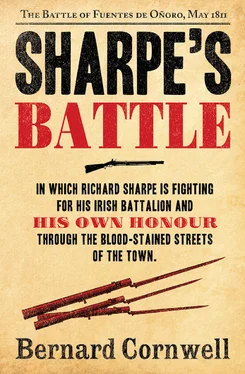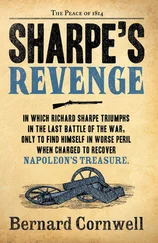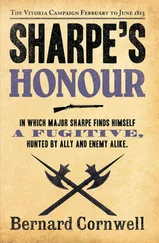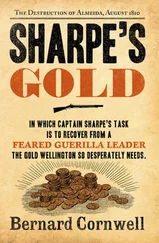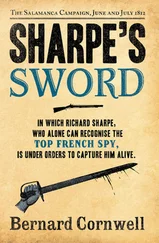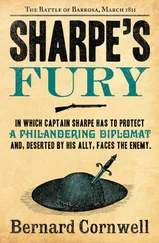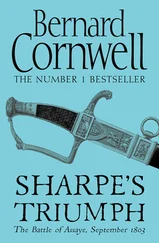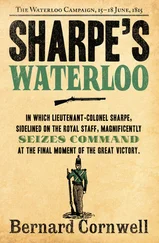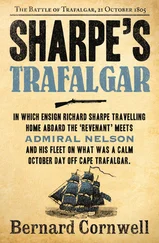‘Or a map?’ Lieutenant Price suggested happily.
‘We’ve got a bloody map. Here.’ Sharpe thrust the balled-up map into the Lieutenant’s hands. ‘Major Hogan drew it for me and I can’t make head nor tail out of it.’
‘I was never any good with maps,’ Price confessed. ‘I once got lost marching some recruits from Chelmsford to the barracks, and that’s a straight road. I had a map that time, too. I think I must have a talent for getting lost.’
‘My grand-da was like that,’ Harper said proudly. ‘He could get lost between one side of a gate and the other. I was telling the Captain here about the time he took a bullock up Slieve Snaght. It was dirty weather, see, and he was taking the short cut –’
‘Shut up,’ Sharpe said nastily.
‘We went wrong at that ruined village,’ Price said, frowning over the creased map. ‘I think we should have stayed on the other side of the stream, sir.’ Price showed Sharpe the map. ‘If that is the village. Hard to tell really. But I’m sure we shouldn’t have crossed the stream, sir.’
Sharpe half suspected the Lieutenant was right, but he did not want to admit it. They had crossed the stream two hours before, so God only knew where they were now. Sharpe did not even know if they were in Portugal or Spain, though both the scenery and the weather looked more like Scotland. Sharpe was supposedly on his way to Vilar Formoso where his company, the Light Company of the South Essex Regiment, would be attached to the Town Major as a guard unit, a prospect that depressed Sharpe. Town garrison duty was little better than being a provost and provosts were the lowest form of army life, but the South Essex was short of men and so the regiment had been taken out of the battle line and set to administrative duties. Most of the regiment were escorting bullock carts loaded with supplies that had been barged up the Tagus from Lisbon, or else were guarding French prisoners on their way to the ships that would carry them to Britain, but the Light Company was lost, and all because Sharpe had heard a distant cannonade resembling far-away thunder and he had marched towards the sound, only to discover that his ears had played tricks. The noise of the skirmish, if indeed it was a skirmish and not genuine thunder, had faded away and now Sharpe was lost. ‘Are you sure that’s the ruined village?’ he asked Price, pointing to the crosshatched spot on the map that Price had indicated.
‘I wouldn’t like to swear to it, sir, not being able to read maps. It could be any of those scratchings, sir, or maybe none.’
‘Then why the hell are you showing it to me?’
‘In a hope for inspiration, sir,’ Price said in a wounded voice. ‘I was trying to help, sir. Trying to raise our hopes.’ He looked down at the map again. ‘Maybe it isn’t a very good map?’ he suggested.
‘It would make good kindling,’ Harper repeated.
‘One thing’s certain,’ Sharpe said as he took the map back from Price, ‘we haven’t crossed the watershed which means these streams must be flowing west.’ He paused. ‘Or they’re probably flowing west. Unless the world’s bloody upside down which it probably bloody is, but on the chance that it bloody isn’t we’ll follow the bloody streams. Here’ – he tossed the map to Harper – ‘kindling.’
‘That’s what my grand-da did,’ Harper said, tucking the crumpled map inside his faded and torn green jacket. ‘He followed the water –’
‘Shut up,’ Sharpe said, but not angrily this time. Rather he spoke quietly, and at the same time gestured with his left hand to make his companions crouch. ‘Bloody Crapaud,’ he said softly, ‘or something. Never seen a uniform like it.’
‘Bloody hell,’ Price said, and dropped down to the path.
Because a horseman had appeared just two hundred yards away. The man had not seen the British infantrymen, nor did he appear to be on the lookout for enemies. Instead his horse just ambled out of a side valley until the reins checked it, then the rider swung himself wearily out of the saddle and looped the reins over an arm while he unbuttoned his baggy trousers and urinated beside the path. Smoke from his pipe drifted in the damp air.
Harper’s rifle clicked as he pulled the cock fully back. Sharpe’s men, even those who had been asleep, were all alert now and lying motionless in the grass, keeping so low that even if the horseman had turned he would probably not have noticed the infantry. Sharpe’s company was a veteran unit of skirmishers, hardened by two years of fighting in Portugal and Spain and as well trained as any soldiers in Europe. ‘Recognize the uniform?’ Sharpe asked Price softly.
‘Never seen it before, sir.’
‘Pat?’ Sharpe asked Harper.
‘Looks like a bloody Russian,’ Harper said. Harper had never seen a Russian soldier, but had a perverse idea that such creatures wore grey and this mysterious horseman was all in grey. He had a short grey dragoon jacket, grey trousers and a grey horsehair plume on his steel-grey helmet. Or maybe, Sharpe thought, it was merely a cloth cover designed to stop the helmet’s metal from reflecting the light.
‘Spaniard?’ Sharpe wondered aloud.
‘The dons are always gaudy, sir,’ Harper said. ‘The dons never did like dying in drab clothes.’
‘Maybe he’s a partisan,’ Sharpe suggested.
‘He’s got Crapaud weapons,’ Price said, ‘and trousers.’ The pissing horseman was indeed armed just like a French dragoon. He wore a straight sword, had a short-barrelled carbine sheathed in his saddle holster and had a brace of pistols stuck in his belt. He also wore the distinctively baggy saroual trousers that the French dragoons liked, but Sharpe had never seen a French dragoon wearing grey ones, and certainly never a grey jacket. Enemy dragoons always wore green coats. Not dark hunting green like the coats of Britain’s riflemen, but a lighter and brighter green.
‘Maybe the buggers are running out of green dye?’ Harper suggested, then fell silent as the horseman buttoned his floppy trousers and hauled himself up onto his saddle. The man looked carefully about the valley, saw nothing to alarm him and so spurred his horse back into the hidden side valley. ‘He was scouting,’ Harper said softly. ‘He was sent to see if anyone was here.’
‘He made a bloody bad job of it,’ Sharpe commented.
‘Even so,’ Price said fervently, ‘it’s a good thing we’re going in the other direction.’
‘We’re not, Harry,’ Sharpe said. ‘We’re going to see who those bastards are and what they’re doing.’ He pointed uphill. ‘You first, Harry. Take your fellows and go halfway up, then wait.’
Lieutenant Price led the redcoats of Sharpe’s company up the steep slope. Half of the company wore the red jackets of Britain’s line infantry while the other half, like Sharpe himself, had the green jackets of the elite rifle regiments. It had been an accident of war that had stranded Sharpe and his riflemen in a redcoat battalion, but sheer bureaucratic inertia had held them there and now it was sometimes hard to tell the riflemen from the redcoats, so shabby and faded were their respective uniforms. From a distance they all looked like brown uniforms because of the cheap Portuguese cloth that the men were forced to use for repairs.
‘You think we’ve crossed the lines?’ Harper asked Sharpe.
‘Like as not,’ Sharpe said sourly, still angry at himself. ‘Not that anyone knows where the damn lines are,’ he said defensively, and in part he was right. The French were retreating out of Portugal. Throughout the winter of 1810 the enemy had stayed in front of the Lines of Torres Vedras just a half-day’s march from Lisbon, and there they had frozen and half starved to death rather than retreat to their supply depots in Spain. Marshal Masséna had known that retreat would yield all Portugal to the British while to attack the Lines of Torres Vedras would be pure suicide, and so he had just stayed, neither advancing nor retreating, just starving slowly through the winter and staring at the lines’ enormous earthworks which had been hacked and scraped from a range of hills across the narrow peninsula just north of Lisbon. The valleys between the hills had been blocked by massive dams or with tangled barricades of thorn, while the hill tops and long slopes had been trenched, embrasured and armed with battery after battery of cannon. The lines, a winter’s hunger and the relentless attacks of partisans had finally defeated the French attempt to capture Lisbon and in March they had begun to retreat. Now it was April and the retreat was slowing in the hills of the Spanish frontier, for it was here that Marshal Masséna had decided to make his stand. He would fight and defeat the British in the river-cut hills, and always, at Masséna’s back, stood the twin fastnesses of Badajoz and Ciudad Rodrigo. Those two Spanish citadels made the frontier into a mighty barrier, though for now Sharpe’s concern was not the grim border campaign that loomed ahead but rather the mysterious grey horseman.
Читать дальше
